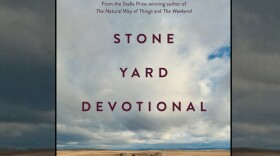
Each week on The Book Show, host Joe Donahue interviews authors about their books, their lives and their craft. It is a celebration of both reading and writers. Joe holds interesting conversations with a variety of authors including Malcolm Gladwell, Lawrence Wright, and Emily St. John Mandel.
As the son of a librarian, Joe has been part of the book world since childhood. His first job was as a library assistant, during college he was a clerk at an independent book store and for the past 25 years he has been interviewing authors about their books on the radio.
He is also the host of The Roundtable on WAMC Northeast Public Radio, a 3-hour general interest talk show. Notable authors he has interviewed include: Kurt Vonnegut, John Irving, John Updike, Alice Walker, Toni Morrison, Arthur Miller, Stephen King, Amy Tan, Anne Rice, Philip Roth, E.L Doctorow, Richard Russo, David Sedaris and Maya Angelou.
Joe has won several awards for his interviews, including honors from the Associated Press, the Edward R. Murrow Awards, the New York State Association of Broadcasters, The Headliners, The National Press Club and the Scripps-Howard Foundation.
E-mail The Book Show.
-
Lauren Groff has long been one of the most daring and emotionally precise writers working today. Her new collection, ‘Brawler,’ returns her to the short story with a set of fierce, searching narratives about people pushed to their limits.
-
C.J. Box has carved out a singular place in contemporary American fiction, blending mystery and the mythic landscapes of the West with characters rooted in moral complexity. His latest novel ‘The Crossroads,’ game warden Joe Pickett is discovered shot and near death while his family seeks justice.
-
Journalist Eugene Robinson has spent decades chronicling American democracy. In his new book, 'Freedom Lost, Freedom Won,' Robinson blends sweeping history with personal narrative, grounding the national struggle for civil rights in his own family’s story.
-
Few contemporary writers have examined the inner life with the intensity and candor of Karl Ove Knausgaard. His latest is 'The School of Night.' In it, he interrogates memory, identity, art, and the meaning we try to impose on our lives.
-
Hailed by The Booker Prize judges as a 'fierce and philosophical interrogation of human existence,' Charlotte Wood’s 'Stone Yard Devotional' chronicles 'one woman’s inward journey to make sense of the world and her life when conflicts and chaos are abundant in both realms.'
-
George Saunders is one of the most original voices in American fiction. His new novel, 'Vigil,' follows Jill 'Doll' Blaine, an afterlife usher summoned to guide an unrepentant oil tycoon toward death. Over one wild night, Saunders confronts power, greed, climate reckoning, and mercy itself.
-
Northern Irish novelist Maggie O’Farrell has long been admired for fiction that blends emotional intimacy with sweeping historical scope, and her work has found devoted readers on both sides of the Atlantic. She is the author of several acclaimed novels, including 'After You’d Gone,' 'The Hand That First Held Mine,' and 'The Marriage Portrait,' books that circle questions of love, loss, memory, and the hidden lives that shape history.Her 2020 novel 'Hamnet;' a reimagining of Shakespeare’s family life through the eyes of his wife and son; became a global bestseller and won the Women’s Prize for Fiction. Now O’Farrell has entered the film world with remarkable success.'Hamnet,' directed by Chloé Zhao, has won the Golden Globe for Best Drama and was nominated for an Academy Award for Best Picture.
-
Matthew Pearl, the bestselling author of "The Dante Club" returns to fiction with a sharp, darkly comic novel, "The Award," that peels back the layers of literary ambition. It is about an earnest young writer trying to find his footing in a world teeming with literary aspiration, one where ambition can warp judgment, and where a single moment of recognition can tip a life off its axis.
-
Laura Dave continues Hannah Hall’s journey in the sequel to her best-seller “The Last Thing He Told Me.” The latest, “The First Time I Saw Him,” explores not what someone else has hidden – but what the narrator herself may have misunderstood about the story she’s been telling herself for years.
-
In his newest novel, "Buckeye," Patrick Ryan explores the ways families hold together even as the past threatens to pull them apart. Moving between generations, Ryan explores how we inherit not just our parents’ habits and hopes, but their unfinished business.











